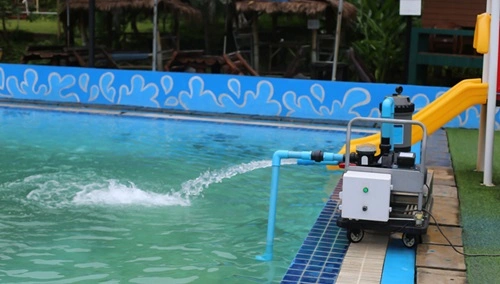Yes, in most areas of the United States, it is illegal to drain your pool into the street or storm drains without following proper procedures. Pool water often contains chemicals like chlorine, salt, and algaecides, which can harm local waterways and ecosystems. Local ordinances and environmental laws regulate pool drainage to prevent pollution and protect public infrastructure.
Why Draining a Pool Into the Street Is Prohibited?
1. Environmental Impact
- Pool water contains chemicals that can harm aquatic ecosystems if they enter storm drains and flow into natural water bodies.
- Chlorine and other pool sanitizers can kill fish and disrupt ecosystems.
2. Storm Drain Systems
- Storm drains are designed to handle rainwater, not chemically treated water. Dumping pool water into these systems can overload them or introduce harmful substances into waterways.
3. Soil and Infrastructure Damage
- Large volumes of water flowing into streets can erode soil, damage curbs, and overwhelm drainage systems.
4. Local Pollution Laws
- Federal laws, such as the Clean Water Act, prohibit the discharge of pollutants into waterways without a permit. Many municipalities have specific ordinances prohibiting pool drainage into streets and storm drains.
Proper Ways to Drain a Pool
1. Discharge to the Sanitary Sewer
- The preferred method is to connect the drainage hose to your property’s sanitary sewer cleanout. This ensures the water is treated before entering waterways.
- Contact your local wastewater authority for instructions and permission before using this method.
2. Dechlorinate the Water
- If draining to a sewer isn’t possible, ensure the water is dechlorinated before draining onto your lawn or landscape. Let the water sit for several days without adding chemicals to allow chlorine to dissipate.
3. Use Professional Services
- Many pool maintenance companies offer safe drainage services that comply with local regulations.
4. Permits and Approvals
- Some jurisdictions require permits for pool drainage, even on private property. Check with local authorities for specific requirements.
Legal Penalties for Improper Pool Drainage
1. Fines and Penalties
- Violations of local pool drainage laws can result in fines ranging from $500 to $5,000, depending on the severity of the infraction.
2. Environmental Cleanup Costs
- Homeowners may be held financially responsible for any environmental damage caused by improper drainage.
3. Legal Action
- Repeated violations or significant environmental harm could lead to lawsuits or legal actions by local or state agencies.
State and Local Regulations
1. California
- Many municipalities in California require pool water to be dechlorinated and drained onto private property or into the sanitary sewer system.
- For example, Los Angeles enforces strict guidelines prohibiting pool drainage into storm drains.
2. Texas
- In Texas, pool water must be drained onto your property or into a sanitary sewer. Local water districts often provide detailed instructions.
3. Florida
- Florida counties regulate pool drainage to prevent chemicals from entering storm drains, with many requiring dechlorination and discharge onto lawns.
Tips for Compliance
1. Plan Ahead: Before draining your pool, contact your local water or wastewater authority to understand the rules and guidelines.
2. Test Chemical Levels: Use a pool test kit to ensure chlorine levels are below 0.01 ppm before discharging water onto lawns or into sewer systems.
3. Use Natural Drainage: Direct the water to landscaped areas or use a slow-draining method to prevent soil erosion and flooding.
Related FAQs
Q1. Can I drain my pool onto my lawn?
Ans: Yes, in many areas, you can drain pool water onto your lawn if it is dechlorinated and does not flood neighboring properties.
Q2. How long does it take for chlorine to dissipate?
Ans: Chlorine levels in pool water typically dissipate after 5–7 days if the water is exposed to sunlight and not chemically treated.
Q3. What happens if I drain my pool into the street?
Ans: You may face fines or legal penalties for violating local environmental regulations. Additionally, the improper discharge could damage public infrastructure.
Q4. Do I need a permit to drain my pool?
Ans: Some municipalities require a permit, especially for large volumes of water. Check with your local water authority.
Q5. Is saltwater pool drainage different?
Ans: Yes, saltwater pools require extra precautions. High salinity can damage soil and vegetation, so it’s essential to consult local guidelines before draining.
Conclusion
Draining your pool into the street is illegal in most areas due to the environmental and infrastructure risks associated with untreated water. Instead, homeowners should follow local regulations, which often require dechlorinating the water and discharging it onto private property or into the sanitary sewer system. By adhering to these guidelines, you can avoid fines, protect the environment, and comply with the law.

